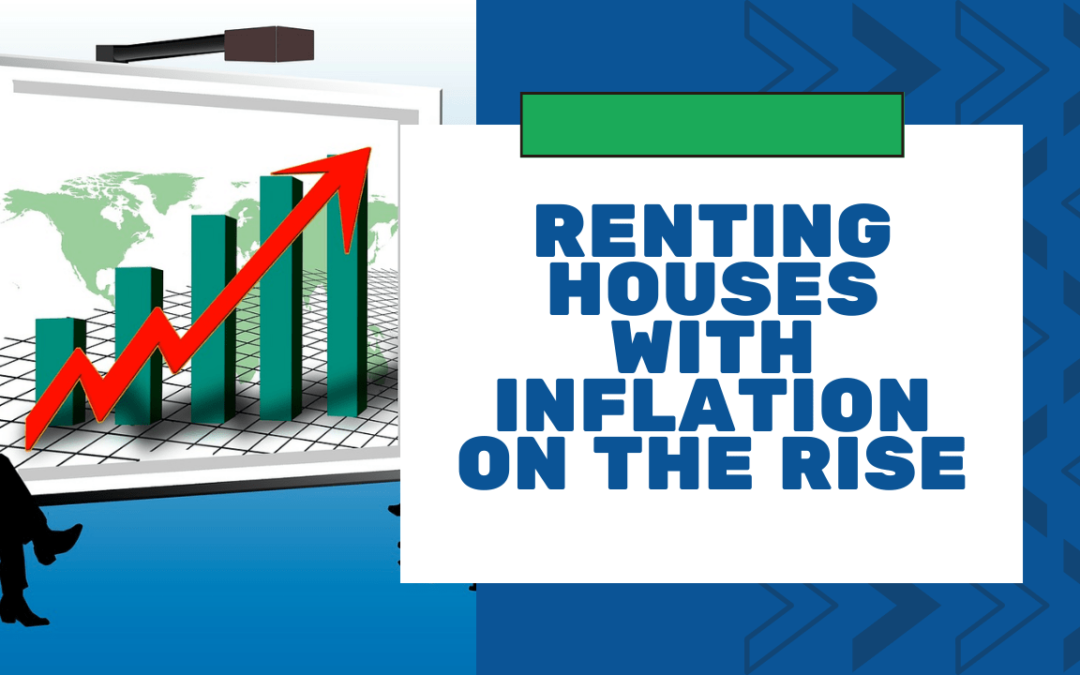It is impossible to avoid the topic of inflation. Everyone is feeling the pinch of paying more for the goods and services we rely upon. Housing is no exception. If you are renting out a property in Dallas Forth Worth, the rise in rental prices is, generally speaking, a good thing for you. It means you are earning more on your investment property. The market continues to stay strong. Even with rents climbing, the tenant pool is growing and well-maintained homes are in high demand.
But, the cost of doing business is also rising for you. Insurance prices are going up, your property taxes may have increased due to the higher value of your home, and you’re paying more for maintenance, landscaping, cleaning, and professional services.
How can you balance the good (higher rents) with the not-so-good (higher costs)?
We’re talking about what inflation means for your rental property, how to handle your tenants, your lease renewals, and your budgeting.
Demand for Dallas Fort Worth Rental Properties
Here’s what’s best about inflation and the soaring prices that people are finding in the housing market: many tenants are turning to rent because they feel priced out of homeownership. Buying a house is more expensive than it was a year or two ago. While mortgage rates are still manageable, the listing price for properties in the Dallas Fort Worth housing market reached a median of $380,000 in March 2022. That’s a 22 percent increase, according to the North Texas Real Estate Information System and the Texas Real Estate Research Center at Texas A&M University.
Instead of buying, more people are choosing to rent. Add those tenants to the additional people moving into the region (1.42 percent population increase in 2022 compared to 2021), and we have a high demand for good rental housing. The inventory hasn’t exactly kept up.
With inflation driving more renters into your tenant pool, you’re looking at less vacancy.
Incomes are increasing, especially as companies pay more due to the need for labor. Those higher incomes will deliver not only more tenants – but also more qualified tenants.
Rental values have risen and continue to rise. If you’re listing a vacant property, you’ll be able to comfortably set a rent price that’s at the top of the range of comparable properties in your neighborhood. You never want to price it too high, but you likely won’t have to negotiate a lower price tag because tenants will be willing to pay what you’re asking.
Inflation and Dallas Lease Renewals
You can also expect the tenant turnover to be lower as inflation drives up rent prices. The tenants you currently have in place will take a look at the available properties on the current market, and unless they really hate where they live, they’ll like realize that they’re only going to pay more if they move.
There are a few considerations you’ll have to make when you’re deciding how much to increase the rent on a tenant who is renewing their lease agreement:
- Increase the rent to stay within the market range, but provide an incentive to keep tenants in place. For example, if your tenant is currently renting your property for $1,600 a month, take a look at the market. Maybe homes like yours are currently renting for $2,000 per month. Instead of raising the rent by $400, which may be a bit of a financial shock to your tenants, raise the rent to $1,850. This still gives you a healthy increase in the rent your collect, but it keeps your tenants at a lower price than they’d find if they decided to move. If your tenant decides to move out, you can go ahead and set the new rent at $2,000. But, you know the value of retaining a good tenant.
- Consider what tenants can afford. You’re thinking about your bottom line and the increase in costs you’re experiencing, but you want to think about your tenants, too. They’re paying more in rent and they’re paying more for food and gas and utilities. Don’t put them in a position where they can’t afford the new rent. You’re likely not qualifying tenants again every time they renew a lease agreement. If you approved them at the $1,600 rent, would they still meet your income requirements at the $1,850 rent? You don’t know. Raising the rent too much at renewal time will cause desperate tenants to renew the lease agreement even if they can’t afford the rental amount. That puts you both in a risky situation.
- Avoiding vacancy and turnover costs is still important. Yes, the market is such that you can easily find a new tenant if your current resident moves out. But you don’t want to pay the increased maintenance costs to repaint, fix up wear and tear items, and prepare the home for that new resident. It’s better for you to retain the tenant you have.
Vacancy and turnover rates fell during the pandemic, and they remain low during this period of higher prices and inflation. Leverage the willingness of your tenants to stay in place by increasing your rent without making them financially unable to stay.
Inflation and Rising Costs for Landlords
Inflation might mean good news for you in terms of higher rents and better tenant retention. However, it’s hard to ignore the fact that your own costs are rising, and they might continue to rise.
As a rental property owner in Dallas Fort Worth, you may find that your insurance rates and your taxes are rising. That’s because your property value has increased so dramatically over the last year or two. While that’s great news for your long-term ROI, a property that’s worth more money is also more expensive to insure. Your tax burden will also be higher because property taxes are based on the value of your home.
Consider these higher costs when you’re setting rent and preparing a lease renewal. Think about them as part of your larger budgeting when you’re planning to invest in a new property as well.
There’s also the rising cost of maintenance and repairs.
This is a tough one because it might lead some landlords to cut back on repairs and replacements that might be necessary. When the cost of replacing an appliance is several hundred dollars higher than you might have expected, it’s tempting to just lead the old appliance in place for a bit longer. Some landlords might consider scaling back their preventative maintenance services such as HVAC annual inspections or checks of the roof or chimney.
This isn’t what you want to do.
A lot of the maintenance you need will cost more. The labor alone is going to come with a higher hourly rate and there’s also a higher cost for materials and supplies. The $350 you paid for a plumbing repair two years ago might now cost $500 or more.
That’s a tough adjustment for your budget. However, you don’t want to cut back on repairs or ignore the maintenance that’s needed. Deferring the necessary work will only cost you more money in the long term. You need to keep your property safe, habitable, and attractive to tenants.
If you’re not already working with a Dallas Fort Worth property management company, these are the best conditions under which to consider it.

- Property managers can find you better tenants. With a good tenant in place, you won’t have to worry about some of the common (and expensive) concerns that many landlords have. There’s less of a risk that you’ll have to chase down late rent, begin an eviction, or deal with excessive property damage.
- Property managers have excellent relationships with vendors and contractors already in place. We cannot eliminate the higher maintenance costs that inflation has delivered. But, we can pass on some of the discounts and savings that our preferred vendors share with us. As a management company, we provide our vendors with far more work than an independent landlord could. So, we benefit from the best pricing that’s available. This helps you keep those costs contained.
- Property managers protect you against liability and risk. With everyone feeling the pinch of inflation, tenants are looking for ways to hold onto more of their money. If you find yourself embroiled in a security deposit dispute or defending yourself against a fair housing claim, you’ll have a lot of extra bills to pay. Property managers can eliminate that risk, ensuring your property is compliant with all local and federal laws. Less risk equals lower costs.
We’d be happy to help you navigate the new, more expensive waters in the Dallas Fort Worth rental market. If you have any questions about what inflation means for your investments specifically, please don’t hesitate to contact us at Assign Property Management.


Recent Comments